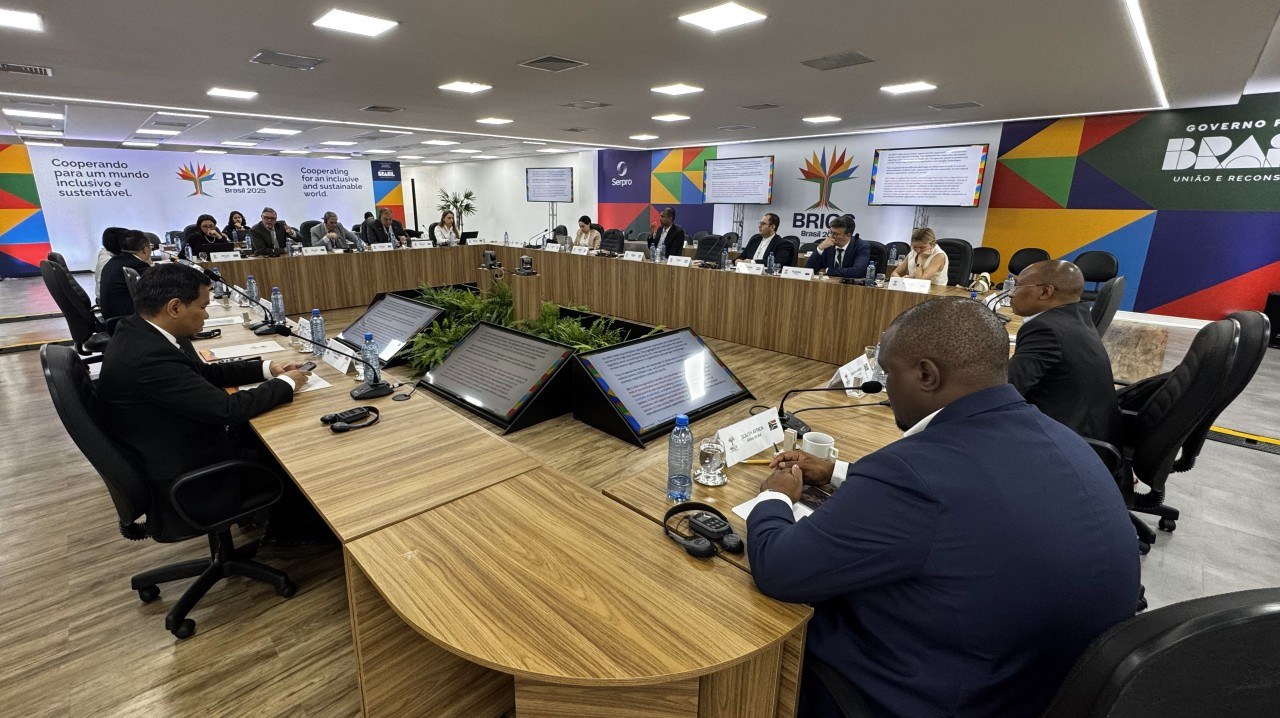BRICS United by Global Standards: harmonization of trade and environmental governance is the theme of the meeting in Brasilia
Member countries debate international standards for sustainable development, ESG, and combating violence against women in organizations

By Inez Mustafa | BRICS Brasil, with contributions from ABNT
On June 17 and 18, 2025, delegations from the Standardization Bodies BRICS countries gathered to strengthen cooperation and address shared challenges related to standardization and adjacent fields. Under the guidance of the Brazilian Association of Technical Standards (ABNT), delegates shared policies for the standardization of carbon accounting, ESG (Environmental, Social and Governance) practices, hydrogen technologies, and systems to prevent and combat violence against women within organizations.
At the opening of the meeting, Mario Esper, President of ABNT, emphasized strategic role of cooperation in standardization amid a global context of economic uncertainty and instability in supply chains. “Standardization plays an increasingly strategic role, serving as a tool for trade integration, innovation, and consumer protection, in alignment with the United Nations Sustainable Development Goals,” Esper stated.
Maria Cristina Rayol, Head of the Market Access Division at the Ministry of Foreign Affairs (Itamaraty), noted that current challenges related to geopolitics, sustainable development, and emerging technologies require targeted efforts to meet the necessary standards— to facilitate trade and address trade barriers.
"If we do not converge on standards, our products will not enter BRICS Member States’ markets. If the challenges are the same, some basic principles remain—and the most fundamental is that countries need one another for their development. We will not reach our full potential unless we work together,” concluded Rayol.
For Mehdi Ghasemi, representative of Iran, “simplifying procedures and promoting mutual recognition within the BRICS framework will significantly reduce trade barriers and enhance economic integration.” The rich and technical discussions across various topics, he noted, reflect the growing maturity of BRICS collaboration. Chen Shuiyan, China’s delegate, added that this dialogue is essential “for BRICS countries to cooperate on standardization to facilitate trade and drive technological development.”
Carbon Accounting
The lack of standardized methodologies for carbon accounting across sectors, countries, and regions increases reporting and measurement costs, and compromises the transparency and efficiency of global supply chains. This topic is especially strategic for Brasil, which has placed it on its international agenda—from the G20 and BRICS to COP30—as governments and companies increasingly rely on such metrics to shape policies, taxes, and subsidies. However, as Rayol pointed out, current carbon accounting standards remain limited, often covering only segments of the production chain and ignoring broader, indirect, and systemic impacts.
“Brasil has one of the world’s cleanest energy mixes, vast forest reserves, and a diversified profile. It is not a carbon-emitting country. In the broader accounting picture, Brasil actually removes carbon from the atmosphere. That is why the government—together with the private sector—is fighting for broader carbon accounting methodologies that clearly reflect the advantages of countries like ours,” said Rayol.
Inconsistent methodologies across sectors and regions increase compliance costs and threaten the integrity of global supply chains. Given this landscape, Rostislav Sirotkin, representing Russia’s Federal Agency for Technical Regulation, stated that “mutual recognition of carbon accounting standards plays a vital role in facilitating trade, ensuring safety, and fostering innovation.” He added that strengthening collaboration among BRICS countries not only supports national economies but also advances a more balanced and equitable global standardization system.
The knowledge exchanged among BRICS countries, said Lizo Makele, CEO of South Africa’s Standards Office, enriches national policymaking with diverse perspectives. “Being here, engaging directly, and hearing what others are saying has been tremendously beneficial. We are now better equipped to return home and improve the work we are doing,” Makele explained.
Low-Emission Hydrogen: Standards Support Certification and Strengthen Global Markets
In one of the presentations, Gabriel Lassery of the Brazilian Hydrogen Association (ABH2) addressed the challenges and opportunities in certifying the low-emission hydrogen supply chain—a strategic vector for the global energy transition.
Lassery introduced ISO TS 19870, an international technical standard that provides a robust methodology for measuring greenhouse gas emissions across the entire hydrogen lifecycle: from production and conditioning to transport and end use.
He emphasized that while hydrogen is often touted as a key to decarbonizing the economy, less than 1% of the hydrogen produced globally today qualifies as low-emission. The standard aims to offer clear, internationally recognized criteria that ensure traceability, credibility, and trust in both domestic and international markets for this fuel.
Brasil has enormous potential to produce hydrogen from renewable sources such as solar, wind, hydroelectric, and biomass energy. The sector is supported by legal frameworks—namely, Federal Laws 14.948 and 14.990, enacted in 2024—that lay down the National Policy on Low-Emission Hydrogen, alongside the National Hydrogen Program (PNH2), which is structured to foster the sector’s growth.
Commitment to Sustainability and Inclusion
The two-day discussions, held at the Federal Data Processing Service (Serpro) headquarters in Brasilia, reaffirmed the commitment of BRICS standardization bodies to develop technical solutions that promote a more sustainable, just, and inclusive global economy. The construction of standards such as those presented contributes directly to tackling global challenges and reinforces the role of standardization as a key tool for economic development, sustainability, and the protection of human rights.
English version by: Tadeu Azevedo (POET/UFC)
Proofreading by: Michel Emmanuel Félix François (UFC)